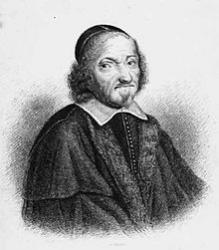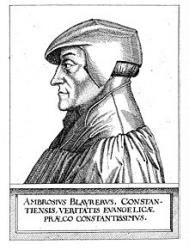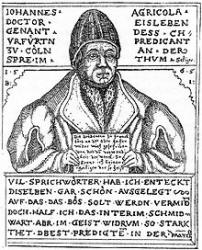Planning worship?
Check out our sister site, ZeteoSearch.org,
for 20+ additional resources related to your search.
- |
User Links
Person Results
L. Tuttiett

1825 - 1897 Person Name: Lawrence Tuttiett, 1825-1897 Author of "O quickly come, dread Judge of all" in The Book of Praise Laurence Tuttiett was born at Colyton, Devon, in 1825; was educated at Christ Hospital, and at King's College, London; ordained Deacon, 1848, Priest, 1849; entered upon the living of Lea Marston, Coleshill, 1854, and subsequently was appointed Curate of S. Paul's, Knightsbridge, London. He is the author of several volumes and tracts.
--Annotations of the Hymnal, Charles Hutchins, M.A. 1872.
==================
Tuttiett, Lawrence, son of John Tuttiett, surgeon in the R.N., was born at Cloyton, Devonshire, in 1825, and educated at Christ's Hospital, and King's College, London. It was originally purposed that he should follow the medical profession, but, abandoning it for the ministry, he took Holy Orders in 1848. In 1854 he became vicar of Lea Marston, Warwickshire; and in 1870 incumbent of the Episcopal Church of St. Andrews, Scotland. He was also preferred to a prebendaryship in St. Ninian's Cathedral, Perth, in 1880. He is the author of several manuals of prayers, published by the Society for Promoting Christian Knowledge and other prose works, and also of:—
(1) Hymns for Churchmen, 1854; (2) Counsels of a Godfather, 1861; (3) Hymns for the Children of the Church, 1862; (4) Germs of Thought on the Sunday Services, 1864; (5) Through the Clouds; Thoughts in Plain Verse, 1866.
From those works and other sources the following hymns have come into common use:—
1. As calmly in the glowing west. Evening.
2. Come, our Father's voice is calling. Confirmation. Appeared in his Hymns for the Children of the Church, 1862, in 6 stanzas of 4 lines. It passed into Mrs. C. Brock's Children's Hymn Book, 1881.
3. Grant us Thy light that we may know. Divine Guidance. Included in his Germs of Thought, &c, 1864, in 6 stanzas of 4 lines. In Horder's Congregational Hymn Book, 1884; the Universal Hymn Book, 1885, it begins, “O grant us light that we may know."
4. I come, 0 Father kind. Holy Communion.
5. Lo, like a bride, in pure array. Septuagesima.
6. No sign we ask from heaven above. After Holy Baptism. Published in his Hymns for Churchmen, 1854, in 4 stanzas of 6 lines. It has passed into several collections, includ¬ing the S. P. C. K. Church Hymns, 1871, Thring's Collection, 1882, &c.
7. Now, eternal Father, bless. Holy Baptism. In his Hymns for the Children of the Church, 1862, in 3 stanzas of 6 lines, and Mrs. Brock's Children's Hymn Book, 1881. In the latter it is attributed to Bishop Maclagan in error.
8. 0 happy Christian children. Divine Protection. From his Hymns for the Children of the Church, 1862, into Mrs. Brock's Children's Hymn Book, 1881, &c.
9. 0 Jesu, ever present. The Good Shepherd. Published in his Germs of Thought, 1864; the S. P.C. K. Church Hymns, 1871, and many others.
10. Shepherd, good and gracious. The Good Shepherd. In his Hymns for the Children of the Church, 1862; Mrs. Brock's Children's Hymn Book, 1881, &c.
11. Sometimes o'er our pathway. In time of Trouble. From his Hymns for the Children of the Church, 1862, in 3 st. of 8 1., into Mrs. Brock's Children's Hymn Book, 1881.
12. When the world is brightest. Litany to the Saviour. Published in his Through the Clouds, &c, 1866, in 10 stanzas of 8 lines, with the note :—"Those words were written for the music of a Roman Litany 'Ave Stella Maria.'" This Litany is in extensive use.
13. Who is this? the long expected. Advent.
In addition to these, several of Mr. Tuttiett's hymns are annotated under their respective first lines, the most popular of which are, "Father, let me dedicate"; "Go forward, Christian soldier"; and "0 quickly come, dread Judge of all." Mr. Tuttiett's hymns are characterised by smoothness of rhythm, directness of aim, simplicity of language, and deep earnestness. Those for special services and seasons are of great merit. He died May 21, 1897.
-- John Julian, Dictionary of Hymnology (1907)
==================
Tuttiett, L., p. 1188, ii. He was born at Colyton, not Cloyton, Devonshire, in 1825. His hymns "As now Thy children lowly kneel (For the Young), and "Give light. O Lord, that we may learn" (The Light of Life) are in Hymns Ancient & Modern, 1904.
--John Julian, Dictionary of Hymnology, New Supplement (1907)
=====================
See also in:
Hymn Writers of the Church
L. Tuttiett
Miles Coverdale

1488 - 1569 Author of "Thou Holy Spirit, we pray to thee" in Songs of the Spirit Coverdale, Miles, D.D., a celebrated English Divine and Reformer, born in Yorkshire, 1487, and educated at Cambridge. He was for some time a Canon of the Order of St. Augustine. On embracing the reformed faith, he went abroad, 1528, and associated with Tyndale and various continental Reformers. His translation of the Bible was published in 1535, and the second version of the New Testament, 1538. Returning to England, in 1551 he was promoted to the see of Exeter. On the accession of Mary he went to Denmark, and then to Geneva. At the latter place he assisted his fellow refugees in producing the celebrated Geneva Bible. In 1560, on the accession of Elizabeth, he returned to England, but instead of resuming his see, he accepted the Rectory of St. Magnus, London Bridge. He died in Feb. 1569, and was buried in St. Bartholomew's church, by the Exchange, Feb. 19, 1569. For his Goostly Psalmes, one of the earliest metrical efforts in the English language, but mainly from the German.
--John Julian, Dictionary of Hymnology (1907)
Miles Coverdale
Ambrosius Blaurer

1492 - 1564 Author of "Wie's Gott gef'llt, [so] gef'llt mor's auch" in Vollständiges Marburger Gesang-Buch Blaurer, Ambrosius, son of Augustine Blaurer, Councillor of Constanz, was born at Constanz, April 4, 1492. In 1513 he graduated at Tubingen and entered the convent of Alpirsbach, in the Black Forest, where he was chosen Prior. After studying Holy Scripture and the writings of Luther, he became dissatisfied with his position and left the convent in 1522, and went to Constanz. In 1523 he openly espoused the cause of the Reformation, and began to preach in 1525. In 1529 he commenced his work as Reformer of Swabia, in which, after the restoration of Duke Ulrich, 1534, he received his help and countenance till 1538, when the growing opposition of the Lutheran party led him to withdraw from Württemberg. He returned to Constanz, where he remained till 1548, when by the operation of the Interim [Agricola] and the seizure of the town by the Emperor, he was forced to flee to Griessenberg, in Thurgau, and in the end of 1549, to Winterthur. He became pastor at Biel, in the Jura, 1551, but returned to Winterthur, 1559, and died there, Dec. 6, 1564 (Koch, ii. 62-76; Allgemeine Deutsche Biographie, ii. 691-693). Koch characterises him as the most important of the hymn-writers of the Reformed Church at the time of the Reformation. Some thirty in all of his hymns are preserved in manuscript at Zurich and Winterthur. The only one translation into English is:—
Wie's Gott gefällt, so gfällts mirs auch. [Trust in God.] Wackernagel, iii. p. 588, quotes it in 8 stanzas of 10 lines from a manuscript of 1562 at Zilrich, "Etlich geistliche gsang und lieder vor jahren geschriben durch meister Ambrosium Blaurern," and thinks it was probably written about 1526. In his Bibliographie, 1855, p. 220, he had cited a broadsheet, c. 1548, where it appears as one of "Zwey schöne Newe Lieder doss frommen Johansen Friderichon von Sachson, welche Er in seiner Gefangkmiss gtdichtet hat" [i.e. 1547-52, after the battle of Mühlberg, 1547]; but this ascription Wackernagel thinks is as little justified by the personality as by the circumstances of the Elector. Though the authorship of the hymn be somewhat doubtful, its value is undeniable, and since its reception into the Bergkreyen, Nürnberg, 1551, it has appeared in most subsequent collections, and is No. 720 in the Unverfälschter Liedersegen 1851. The translations are:—(1) "God's will is mine: I dare not stray," by Dr. G. Walker, 1860, p. 91. (2) "What pleaseth God, that pleaseth me," by Miss Winkworth, 1869, p. 124.
-- John Julian, Dictionary of Hymnology (1907)
Ambrosius Blaurer
Johann C. Arnschwanger
1625 - 1696 Person Name: Joh. Chr. Arnschwanger, † 1696 Author of "Nun, liebe Seel, nun ist es Zeit" in Kirchen-Gesangbuch für Evangelisch-Lutherische Gemeinden Arnschwanger, Johann Christoph, son of Georg Arnschwanger, merchant in Nürnberg, was born at Nürnberg Dec. 28, 1625. He entered the University of Altdorf in 1644, and that of Jena in 1647, where he graduated M.A. Aug. 9, 1647. After short periods of residence at Leipzig, Hamburg, and Helmstädt he returned to Nürnberg in 1650. There he was successively appointed Stadt-vicar in 1651, Diaconus of the St. Aegidien Church 1652, Morning Preacher in St. Walpurga's 1654, and Diaconus of the Church of St. Lorenz 1659. where he became Senior 1670, and Archidiaconus 1690. He died at Nürnberg, Dec. 10, 1696. (Koch, iii. 517-520; Allgemeine Deutsche Biographie, i. 597.)
A lover of music and poesy, he was the correspondent of Anton Ulrich (q. v.) and a member of the Fruitbearing Society (1675). He did not join the Nürnberg Pegnitz Shepherd Order, seeking in his poetical work simplicity and fitness for popular use rather than their somewhat affected “learnedness." The best of his hymns, some 400 in all, the most important being those published in 1659, appeared in his:—
i. Neuegeistliche Lieder, Nürnberg, 1659, in two books, each containing 20 hymns, set to music by the best organists and choir masters in Nürnberg.
ii. Heilige Palmen und Christliche Psalmen, Nürnberg, 1680, with 150 hymns in three divisions, with melodies by the musicians of Nürnberg.
Of these hymns the only one translated into English is:—
Auf, ihr Christen, lasst uns singen. [Easter.] First published in 1659 as above, Bk. i., No. 13, in 12 stanzas of 11 lines, entitled "On the Victorious Resurrection of Jesus Christ from the dead, in which our future Resurrection is also set forth." Included in the Nürnberg Gesang-buch, 1676, No. 227, as No. 98 in pt. ii., 1714, of Freylinghausen's Gesang-Buch, and recently (reduced to stanzas i., ix.) as No. 213 in the Berlin Gesang-Buch, 1829. The only translation in common use is, “Up, ye Christians, join in singing," from the Berlin Gesang-Buch in N. L. Frothingham's Metrical Pieces, Boston, U.S., 1870, p. 194, and thence altered and beginning, "Rise, ye Christians," as No. 644 in the Swedenborgian Collection, Lond., 1880. [Rev. James Mearns, M.A.]
-- John Julian, Dictionary of Hymnology (1907)
Johann C. Arnschwanger
Leonard Woolsey Bacon
1830 - 1907 Person Name: Leonard W. Bacon Translator (from German) of "In Peace and Joy I Now Depart" in The Cyber Hymnal
Leonard Woolsey Bacon
J. Lindenann
Author of "Jesu, wollst uns weisen" in Vollständiges Marburger Gesang-Buch
J. Lindenann
Johann Agricola

1494 - 1566 Person Name: Johannes Agricola Author of "Froehlich wollen wir Halleluja singen" in Vollständiges Marburger Gesang-Buch Agricola, Johann or Johannes (latinized from Schneider, (Schnitter) or Sartor, also called Magister Islebius), born April 20, 1492, at Eisleben, where his father was a tailor. During his University course at Wittenberg, Luther took a great interest in him, entertained him at his own table, took him with him to Leipzig for the disputation, in 1519, with Dr. Eck, and in 1525 procured for him the position of Rector of St. Andrew's School at Eisleben, and preacher at St. Nicholas's Church there. He remained in Eisleben till 1536, working hand in hand with Luther; but after his removal to Wittenberg, in 1536, as one of the lecturers in the University, he developed Antinomian views, and, in 1537, published a series of theses which Luther answered in six disputations, 1538-40. On his appointment as Court Preacher at Berlin, in 1540, he formally renounced these opinions, and professed adherence to Wittenberg orthodoxy. But after his subsequent appointment as General Superintendent of the Mark, he gradually not only sought the esteem of the great, but, in order to gain the favour of the Emperor, joined with two representatives of the Romish Church in drawing up a Formula of Union (The Interim) which was presented to the Imperial Diet, held at Augsburg, and adopted by the Diet on May 15, 1548. By this action he disgusted the Lutherans, and procured for himself only discredit. He died at Berlin, Sept. 22, 1566. He was one of the best preachers of his time, and compiled one of the earliest collections of German Proverbs, first published at Zwickau, 1529 [the British Museum copy was printed at Hagenau, 1529] ( Koch, i. 278-281. Allgemeine Deutsche Biographie, i. 146-48).
Four hymns by him appeared in the early Lutheran hymnbooks, two of which were retained by Luther in Babst's Gesangbuch, Leipzig, 1545.
1. Ich ruf zu dir, Herr Jesu Christ. [ Supplication.] Wackernagel, iii. pp. 54-55, gives two forms of this, in 5 stanzas of 9 lines, the first from Geistliche Lieder, Erfurt, 1531, the second from an undated broadsheet before 1530, entitled, "A new hymn of supplication for Faith, Love, and Hope, and for a Holy Life; composed by John of Eisleben, preacher to John Duke of Saxony." Fischer, i. 345, refers to the Nürnberg broadsheet, c. 1526, quoted in Wackernagel's Bibliographie, 1855, p. 89, and adds that in his opinion the disfavour into which Agricola fell after the outbreak of the Antinomian controversy caused the suppression of his name in the hymn-books. After appearing in Klug's Geistliche Lieder, 1529, the hymn was included in almost all subsequent hymn-books, and so recently as No. 379 in the Unverfälschter Liedersegen, 1851.
It is sometimes erroneously ascribed to Paulus Speratus, an assumption originating with the Riga Gesang-buch of 1664. It was a favourite hymn of Valerius Herberger, of P. J. Spener (who requested it to be sung at his deathbed), and of many others.
Translations in common use:—
1. Lord Jesu Christ, I cry to Thee. A good translation, omitting stanza iv., by A. T. Russell, as No. 200 in his Psalms & Hymns, 1851.
2. Lord, hear the voice of my complaint. A full and very good translation as No. 116 by Miss Winkworth in her Chorale Book for England, 1863.
Other translations are:—
(1) “I call on the, Lorde Jesu Christ," by Bp. Coverdale, 1539 ( Remains, 1846, p. 560), repeated, slightly altered, in the Gude and Godly Ballates (ed. 1568, folio 34), ed. 1868, p. 57. (2) "I cry to Thee, my dearest Lord," by J. C. Jacobi, 1122, p. 68; in his edition, 1732, p. 114, altered to "To Thee, 0 Lord, I send my cries," and thence as No. 310 in pt. i. of the Moravian Hymn Book 1754; omitted in 1789 and 1801; in the Supplement of 1808, stanzas i., iv. were included as No. 1082, and repeated in later editions altered to "To Thee I send my fervent cries." (3) "I cry to Thee, 0 Christ our Lord!" by N. L. Frothingham, 1870, p. 205. [Rev. James Mearns, M.A.]
--John Julian, Dictionary of Hymnology (1907)
Johann Agricola
Lucas Bacmeister
1578 - 1638 Person Name: Lucas Backmeister, † 1638 Author of "Wenn einer alle Kunst und alle Weisheit hätte" in Kirchen-Gesangbuch für Evangelisch-Lutherische Gemeinden
Lucas Bacmeister
Johann Bornschürer
1625 - 1677 Person Name: Joh. Bornschürer, † 1677 Author of "O Gott, da ich gar keinen Rath" in Kirchen-Gesangbuch für Evangelisch-Lutherische Gemeinden Bornschürer, Johannes, born Nov. 5, 1625, at Schmalkalden. After studying at the Universities of Marburg, Jena, Erfurt, and Strassburg he became, in 1650, pastor at Brotterode in Hesse Cassol, 1657 at Steinbach-Hallenberg, 1661 diaconus at Schmalkalden, and in 1670 decan in the town of Tann, where he died Dec. 5, 1677 (Koch, iii. 430; Allgemeine Deutsche Biographie, iii. 176). To the hymn-book which he edited for use in Tann, published as Geistliche Lieder zu Ubung christlicher Gottseeligkeit, at Meiningen, 1676, he contributed five hymns, one of which is:—
Gott Vater, höre unser Bitt. [Holy Baptism]. This prayer to the Holy Trinity for a blessing on the child, appeared as No. 6 of the Baptismal Hymns in 1676, as above, p. 435, in 4 stanzas of 6 lines. v In the Unverfälschter Liedersegen, 1851, No. 260. The only translation in common use is "O God the Father! hear our prayer," a good and full translation by A. T. Russell, Nos. 154,155, in his Psalms & Hymns, 1851, No. 155 beginning "O Thou most Holy Trinity," being a translation of stanza iv. [Rev. James Mearns, M.A.]
-- John Julian, Dictionary of Hymnology (1907)
Johann Bornschürer
Franz Algermann
1548 - 1613 Person Name: Franciscus Algermann Author of "Ach Herr, wie sind meiner Feind so viel" in Vollständiges Marburger Gesang-Buch
Franz Algermann


 My Starred Hymns
My Starred Hymns


